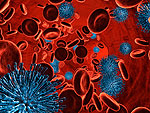 Resveratrol was first discovered by scientists way back in the 1940s. It wasn’t until about 1942, however, that reports about resveratrol’s beneficial effects on the heart began to appear. It turned out that the phytochemical could help significantly in the fight against heart disease by helping to lower LDL (“bad”) cholesterol
Resveratrol was first discovered by scientists way back in the 1940s. It wasn’t until about 1942, however, that reports about resveratrol’s beneficial effects on the heart began to appear. It turned out that the phytochemical could help significantly in the fight against heart disease by helping to lower LDL (“bad”) cholesterol
RECOMMENDED: Why the Fuss Over Resveratrol?
Now, in the latest health news, resveratrol is being touted for its brain-protecting abilities.
Researchers in China have investigated the potential for resveratrol to reduce the risk for neurodegenerative disorders, including progressive forms of dementia such as Alzheimer’s disease. Alzheimer’s is the most common brain disease in the elderly.
After conducting tests, the researchers were able to determine that resveratrol promotes the non-amyloidogenic cleavage of the amyloid precursor protein. What does that mean? In short, resveratrol helps amyloid proteins break down in such a way that they don’t produce beta amyloid — an amino acid that is the main component of the amyloid plaques found in the brains of Alzheimer’s disease patients. When the amyloid precursor protein is functioning in a healthy way, it regulates synapse formation and boosts neural plasticity. Neural plasticity plays a role in many things in your brain, but the most important for you to know about are learning, memory, and recovery from brain damage.
Make sure you boost your brain health and protect it from disease by eating foods rich in resveratrol. One heavily promoted source of resveratrol is red wine. But if you want to avoid drinking too much alcohol, rest assured that scientists have tracked the presence of resveratrol in many different foods and herbs. Try adding grapes, berries and peanuts to your weekly diet.
Along with its neuroprotective effects, there is also increasing evidence that this phytochemical may play a beneficial role in treating certain cancers, reducing pain and inflammation, and helping to speed up your recovery when you suffer tissue injury.
